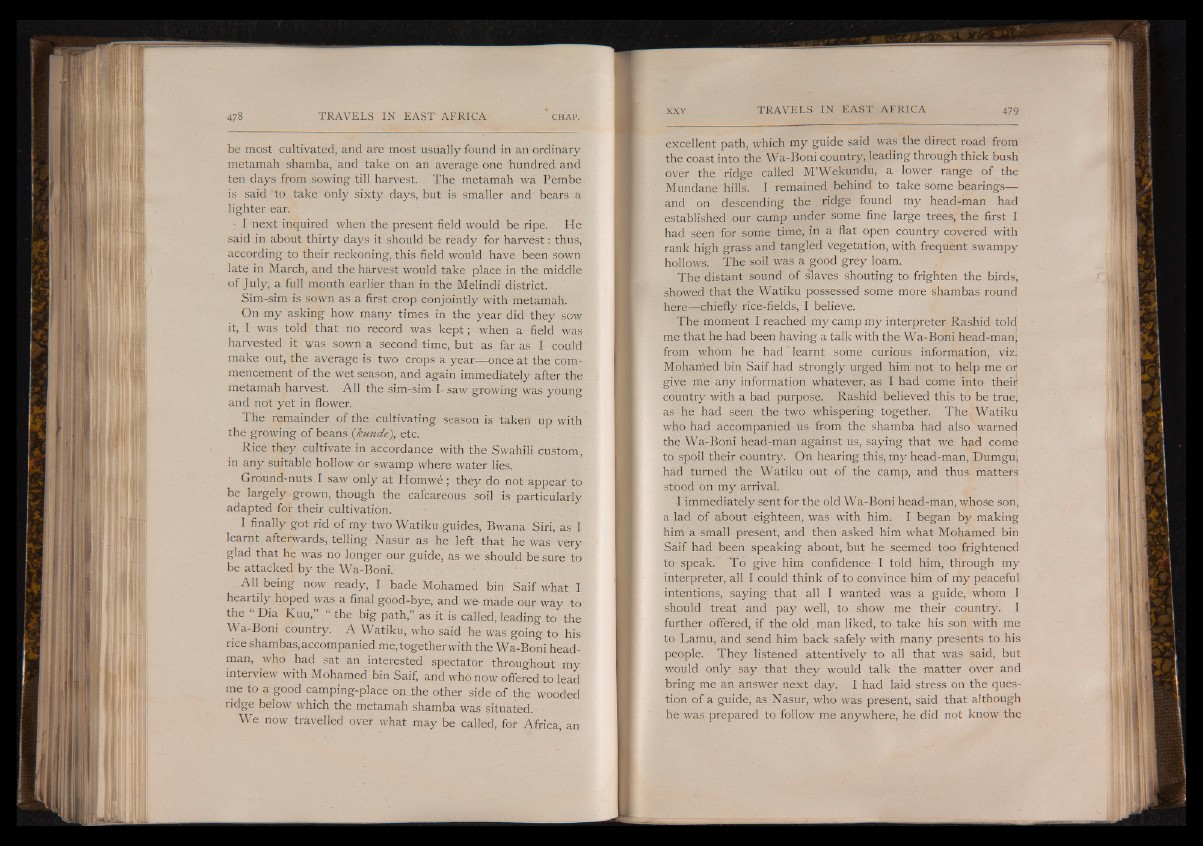
be most cultivated, and are most usually found in an ordinary
metamah shamba, and take on an average one hundred and
ten days from.sowing till harvest. The metamah wa Pembe
is said to take only sixty days, but is smaller and bears a
lighter ear.
- I next inquired when the present field would be ripe. He
said in about thirty days it should be ready for harvést : thus,
according to their reckoning, this field would have been sown
late in March, and the harvest would take place in the middle
of July, a full month earlier than in the Melindi district.
Sim-sim is sown as a first crop conjointly with metamah.
On my asking how many times in the year did they sow
it, I was told that no record was kept ; when a field was
harvested it was sown a second time, but as far as I could
make out, the average is two crops a year— once at the commencement
of the wet season, and again immediately after the
metamah harvest. All the sim-sim I • saw growing was young
and not yet in flower.
The remainder of the cultivating season is taken up with
thé growing of beans.(kunde), etc.
Rice they cultivate in accordance with the Swahili custom,
in any suitable hollow or swamp where water lies.
Ground-nuts I saw only at Homwé ; they do not appear to
be largely grown, though the calcareous soil is particularly
adapted for their cultivation.
I finally got rid of my two Watiku guides, Bwana Siri, as I
learnt afterwards, telling Nasur as he left that he was very
glad that he was no longer our guide, as we should be sure to
be attacked by the Wa-Boni.
All being now ready, I bade Mohamed bin Saif what I
heartily hoped was a final good-bye, and we-made our way to
the Dia Kuu, ‘ the big path,” as it is called, leading to the
Wa-Boni country. A Watiku, who said he was going to his
rice shambas, accompanied me, together with the Wa-Boni headman,
who had sat an interested spectator throughout my
interview with Mohamed bin Saif, and who now offered to lead
me to a good camping-place on the other side of the wooded
ridge below which the metamah shamba was situated.
We now travelled over what may be called, for Africa, an
excellent path, which my guide said was the direct road from
the coast into the Wa-Boni country, leading through thick bush
over the ridge called M’Wekundu, a lower range of the
Mundane hills. I remained behind to take some bearings—
and on descending the ridge found my head-man had
established our camp under some fine large trees, the first I
had seen for some time, in a flat open country covered with
rank high grass and tangled vegetation, with frequent swampy
hollows. The soil was a good grey loam.
The distant sound of slaves shouting to frighten the birds,
showed that the Watiku possessed some more shambas round
here— chiefly rice-fields, I believe.
The moment I reached my camp my interpreter Rashid told
me that he had been having a talk with the Wa-Boni head-man;
from whom he had learnt some curious information, viz,
Mohamed bin Saif had strongly urged him not to help me of
give me any information whatever, as I had come into their
country with a bad purpose, Rashid believed this to be true,
as -he had seen the two whispering together. The Watiku
who had accompanied us from the shamba had also warned
the Wa-Boni head-man against us, saying that we had come
to spoil their country. On hearing this, my head-man, Dumgu,
had turned the Watiku out of the camp, and thus matters
stood on my arrival.
-I immediately sent for the old Wa-Boni head-man, whose son;
a lad of about eighteen, was with him. I began by making
him- a small present, and then asked him what Mohamed bin
Saif had been speaking about, but he seemed too frightened
to speak. To give him confidence I told him, through my
interpreter, all I could think of to convince him of rhy peaceful
intentions, saying that all I wanted was a guide, whom I
should treat and pay well, to show me their country. I
further offered, if the old man liked, to take his son with me
to Lamu, and send him back safely with many presents to his
people. They listened attentively to all that was said, but
would only say that they would talk the matter over and
bring me ah answer next day. I had laid stress on the question
of a guide, as Nasur, who was present, said that although
he was prepared to follow me anywhere, he did not know the